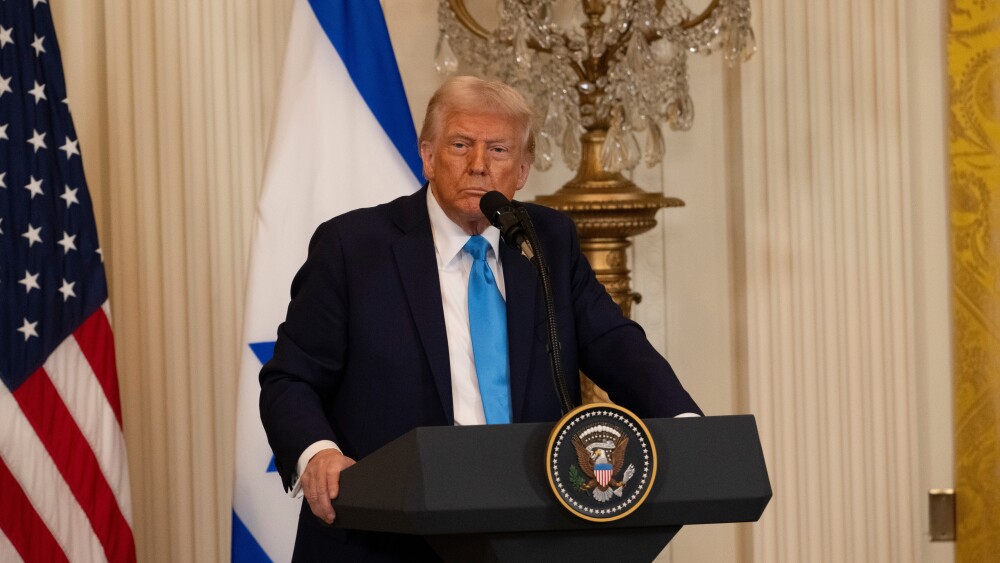On June 23, President Donald Trump unilaterally declared a ceasefire between Israel and Iran. At of the time of this writing, Iran has confirmed a ceasefire, according to the New York Times, and Israel is considering its options. A premature ceasefire will repeat the mistake the United States made in 1991. By pausing the conflict before a political conclusion, the United States will leave the door open for the two sides to resume the war.
Ceasefire and peace are different. A ceasefire is a strategic pause between two phases of a conflict. Peace is a post-conflict state that emerges out of political rearrangement. For peace between Israel and Iran to occur, political conditions in Iran must change.
The United States missed this opportunity in 1991. Following the expulsion of the Iraqi military from Kuwait, Generals Norman Schwarzkopf and Sultan Hashim Ahmad al-Tai signed a ceasefire agreement. Therefore, Saddam Hussein did not have to take responsibility for the defeat.
A ceasefire is a strategic pause between two phases of a conflict. Peace is a post-conflict state that emerges out of political rearrangement.
The second mistake was President George H.W. Bush’s calling for an uprising in Iraq without providing help to the protesters. Saddam’s forces suppressed the Shi’ites, and Kurds who put their trust in the United States and took to the streets were brutally suppressed. Saddam used helicopter gunships against them and chemical weapons against Kurds. By the lowest estimates, he killed tens of thousands.
Saddam directed his anger at his people and punished them. Meanwhile, the U.S. president, who had encouraged the uprising, was parading his forces in a tickertape victory parade.
To the extent that there was a political rearrangement, it was increased domestic repression and loss of trust in the United States among average Iraqis. However, Iraq’s foreign policy objectives remained unchanged. Eventually, the United States created a no-fly zone over northern Iraq. Over the next decade, Saddam continued his aggression, tried to assassinate Bush, and remained uncooperative about his weapons of mass destruction program, forcing the United States to bomb his suspected chemical weapons stockpile in 1998. Strategically degraded, the Iraqi problem ultimately led to a far costlier war as Saddam dared the international community to respond to his defiance of sanctions.
The definition of insanity is doing the same thing and expecting different results. It is politically tempting for the Trump administration to impose a ceasefire and declare victory, but this will kick the can down the road. Likely, the Islamic Republic will increase its repression and ordinary Iranians will suffer.
Iranians will become less likely to take to the streets in the future because they will conclude foreign assistance to be a mirage. The United States and Israel currently have total control over Iranian skies, the regime is on its knees, and both Trump and Prime Minister Benjamin Netanyahu have flirted with encouraging regime change. If Iranians follow their calls, only to be left to the meat grinder, there will not be another popular uprising for a generation.
Ultimately, peace depends on the Iranian people. Trump and Netanyahu should give Iranians their best shot at a revolution to overthrow their oppressors.
Trump should demand that Supreme Leader Ali Khamenei sign the agreement to terminate the war.
First, Trump should demand that Supreme Leader Ali Khamenei sign the agreement to terminate the war. This will shatter his stature within the rank-and-file of the security forces, who will never take him seriously again. The Islamic Republic propagates that Imam Husayn ibn Ali is the ultimate ideal of resistance for dying but not accepting oppression and humiliation. Accepting the humiliation of signing an unfavorable termination to the hostilities will make him unworthy of being the deputy of the messiah and the caretaker of Husayn ibn Ali’s line.
Second, Israel should encourage Iranians to rise up and then protect them. Israel’s air dominance is key. Helicopters are an essential weapon for the regime during protests. They are used for gathering intelligence on protests to inform the suppression forces on where and how many men should be deployed. Second, security forces shoot at protesters from helicopters. This is effective because it terrorizes people and allows for more targets to be hit.
Israel’s continued air operation in Iran will prevent the regime from using helicopters to crack down on protests. It will also allow Israel to jam the security forces’ communications and disrupt their command-and-control apparatus to give protesters the best chance they could have.
Possibly most importantly, it will provide a morale boost. In the past, protests have not died down because of mere violence but a discouragement that help was not coming. With help already present, Iranians will be more courageous than before and more willing to absorb casualties.
Iranians have good reasons not to come to the streets. In 1998, 2003, 2009, 2017, 2019, and 2022, the regime brutally suppressed them without the protestors receiving help from the outside world. To make matters worse, the United States embraced appeasement diplomacy soon after most of those uprisings. They are right not to trust America, but the jury on Israel is out. If Israel is willing to pick up the tab, the Trump administration does not need to get involved. It only needs to stay out of Israel’s way and not force it into a premature ceasefire.







